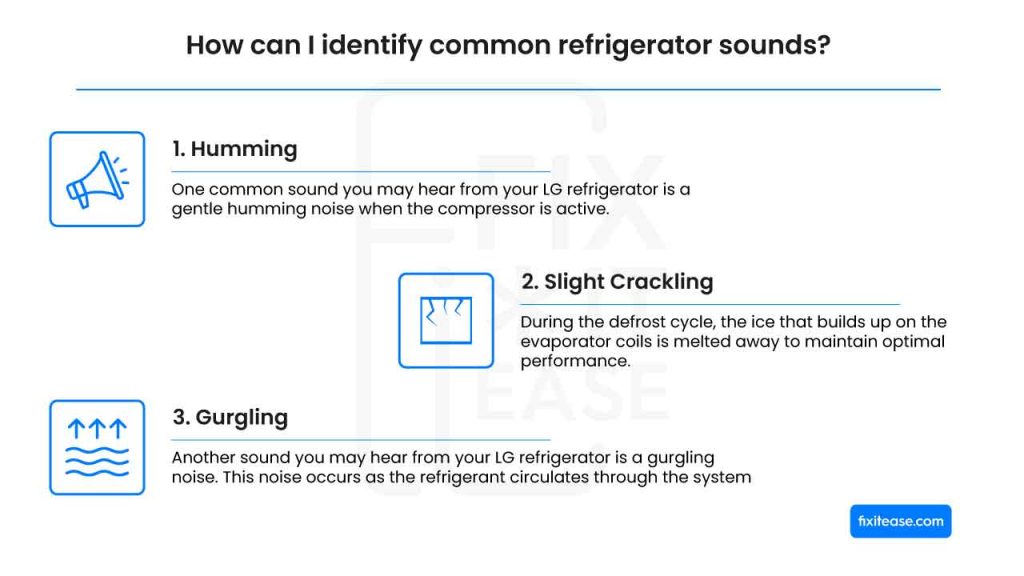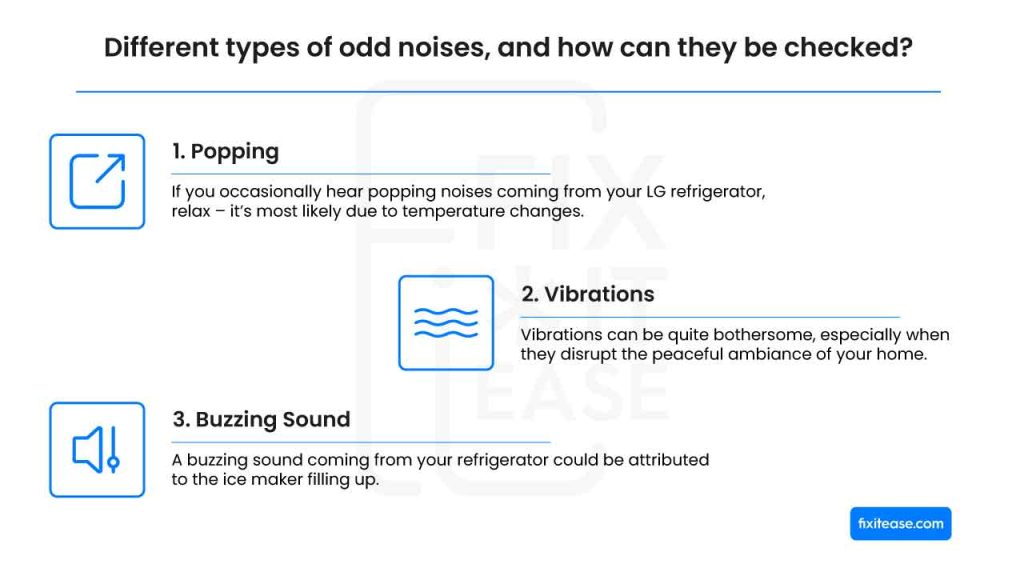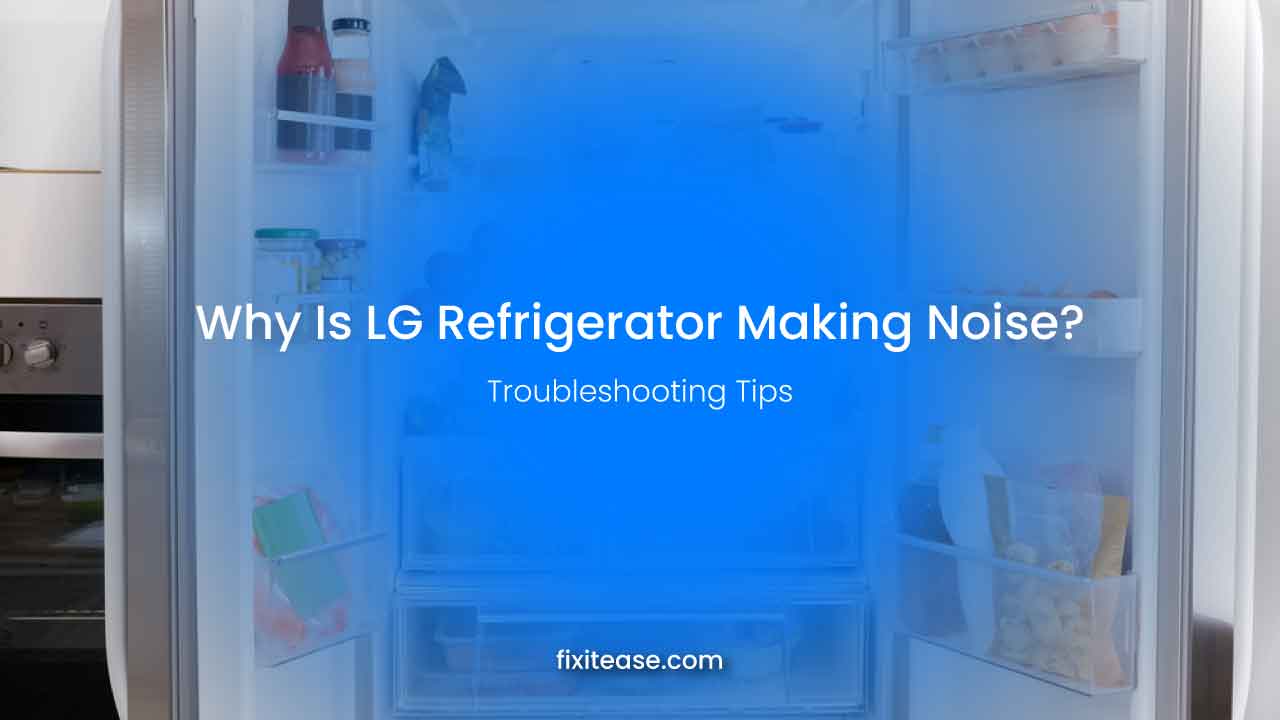Why Is LG Refrigerator Making Noise? Easy Troubleshooting Tips
If your LG refrigerator is making noise, it could be due to problems with the condenser fan motor or the evaporator fan motor. It’s essential to quickly identify and address these issues to prevent additional damage and ensure proper appliance functioning. While some whizzing or buzzing from the compressor is normal during operation, persistent loud noises for more than an hour may require further investigation.
Is your LG refrigerator making an unusual noise that is causing concern? A noisy refrigerator can be quite bothersome and might even indicate an underlying issue. We will explore some common reasons why your LG refrigerator might be making noise and discuss potential solutions. So, let’s delve into the details and tackle this issue head-on!
How Can I Identify Common Refrigerator Sounds?

A refrigerator is an essential appliance in every household, working tirelessly to keep our food fresh and beverages cold. However, over time, you may notice some unusual sounds coming from your LG refrigerator.
While it’s normal for refrigerators to make some noise during operation, certain sounds might indicate a potential issue.
1. Humming
Possible Reason: When The Compressor Is Active
One common sound you may hear from your LG refrigerator is a gentle humming noise when the compressor is active.
The compressor is responsible for cooling the refrigerant and is the heart of the cooling system. As it operates, a low humming sound can be detected, which is typically not a cause for concern.
2. Slight Crackling
Possible Reason: During The Defrost Cycle
During the defrost cycle, the ice that builds up on the evaporator coils is melted away to maintain optimal performance. This process can create a slight crackling or sizzling sound, similar to the sound of ice cubes being dropped into a glass of water.
This noise is normal, indicating that the defrost cycle is functioning correctly and preventing excessive icing.
3. Gurgling
Possible Reason: As Refrigerant Flows
Another sound you may hear from your LG refrigerator is a gurgling noise. This noise occurs as the refrigerant circulates through the system, absorbing heat and keeping your food cold. The gurgling sound is often likened to the sound of water running through pipes.
It indicates that the refrigerant is flowing as it should, ensuring efficient cooling performance.
If you notice any other unusual or loud sounds coming from your LG refrigerator, it is recommended to investigate further to determine the cause. Some noises may indicate a potential problem, such as a faulty fan motor or compressor issue.
In such cases, it is advisable to contact a professional technician to diagnose and resolve the issue to avoid any further damage or inconvenience.
What are the different types of odd noises, and how can they be checked?

When it comes to your LG refrigerator making noise, it’s important to address the issue promptly. Ignoring unusual sounds could lead to further damage and potentially costly repairs.
1. Popping
Causes: To Temperature Changes
If you occasionally hear popping noises coming from your LG refrigerator, relax – it’s most likely due to temperature changes. As the refrigerator adjusts itself to maintain the optimal temperature, the expansion and contraction of certain components can create these sounds.
However, it’s important to verify that the noises are indeed related to temperature changes and not indicative of a larger issue.
Here’s how you can check:
- Make sure the popping sounds coincide with the compressor cycling on and off.
- Check that your refrigerator is properly leveled, as an unlevel unit can cause additional stress on components, resulting in louder popping noises.
- Inspect the refrigerator’s gaskets and ensure they are sealing properly. Faulty gaskets can cause temperature fluctuations and potentially lead to excessive popping sounds.
2. Vibrations
Origin From: From Loose Parts Or Leveling
Vibrations can be quite bothersome, especially when they disrupt the peaceful ambiance of your home. Addressing the source of these vibrations is essential to restore quiet operation to your LG refrigerator.
Loose parts or improper leveling can commonly cause these vibrations. To identify and address the issue, follow these steps:
Check for any loose components such as condenser fan blades, shelves, or drawers. Tighten or secure them if necessary to eliminate potential sources of vibrations.
Verify that your refrigerator is properly leveled. Uneven flooring or an unbalanced unit can result in excessive vibrations. Use a leveling tool to ensure stability and adjust the leveling feet accordingly.
3. Buzzing Sound
Possible Reason: From The Ice Maker Filling
A buzzing sound coming from your refrigerator could be attributed to the ice maker filling up. While this is generally normal, there are certain checks to perform to ensure everything is working as it should:
| Steps | Actions |
| 1. Confirm water line connection | Ensure the water line is securely connected with no kinks or restrictions. |
| 2. Inspect water valve | Check the water valve for obstructions or debris causing buzzing. Clean or replace if needed. |
| 3. Check ice maker components | Examine components like the fill tube and fan for damage or malfunction. Replace faulty parts. |
How can I distinguish between normal and abnormal noises?
The sound of a refrigerator humming in the background is a common occurrence in most households. However, when your LG refrigerator starts making unusual noises, it can be quite alarming. Identifying whether these noises are normal or abnormal is the first step in pinpointing the source of the problem.
Normal refrigerator noises can include sounds such as a gentle humming, buzzing when the compressor is running, or occasional clicking when the defrost timer switches on and off. These noises are usually not a cause for concern and indicate that your refrigerator is functioning as it should.
Abnormal refrigerator noises, on the other hand, are often more distinctive and can indicate underlying issues. These noises can include loud banging, clanking, hissing, screeching, or squealing sounds.
If you hear any of these noises coming from your LG refrigerator, it’s important to identify the exact source of the problem to prevent further damage and potential breakdown.
Methods For Locating The Exact Source Of Sound Within The Fridge
When it comes to pinpointing the exact source of noise within your LG refrigerator, there are several methods you can try. These methods can help you identify whether the noise is coming from the compressor, fans, ice maker, or any other components within the appliance.
Visual Inspection
Start by visually inspecting the refrigerator both inside and outside. Look for any loose or damaged parts that could be causing the noise.
Check the condenser fan, evaporator fan, and any vents for obstructions or debris that may be interfering with their operation.
Listening Carefully
Next, listen carefully to determine the approximate location of the noise. Open the refrigerator door and try to pinpoint whether the noise is coming from the freezer, refrigerator section, or the back of the appliance.
This can help narrow down the possible causes and make it easier to troubleshoot.
Removing Accessories
If the noise is coming from the freezer section, try removing any accessories such as ice trays or shelves.
Sometimes, these accessories can rattle or vibrate, causing unusual noises. Removing them temporarily can help determine if they are the cause of the problem.
Contacting a Professional
If you are unable to locate the exact source of the noise or if you are unsure about performing any troubleshooting steps, it is advisable to contact a professional technician.
They have the experience and expertise to diagnose and repair any issues with your LG refrigerator, ensuring its optimal performance and longevity.
How to Quickly Fix Basic Noise Issues?
When your LG refrigerator starts making unusual noises, it can be both distracting and concerning. However, many noise issues can be easily resolved with some basic troubleshooting.
Method-1: Adjusting The Refrigerator’s Leveling Feet
One of the first things you can check when your LG refrigerator is making noise is the leveling feet. These feet are designed to keep the refrigerator stable and level on the floor. If the feet are not properly adjusted, it can cause the refrigerator to vibrate and create noise.
To adjust the leveling feet on your LG refrigerator, follow these steps:
- Locate the adjustable feet at the bottom of the refrigerator.
- Using a wrench or pliers, turn the feet clockwise or counterclockwise to raise or lower the refrigerator.
- Adjust the feet until the refrigerator is level and stable on the floor.
Once you have adjusted the refrigerator’s leveling feet, check if the noise issue has been resolved. If the noise persists, you can move on to the next troubleshooting step.
Method-2: Obstructed Fan Blades Or Air Vents
Another possible cause of noise in your LG refrigerator could be obstructed fan blades or air vents. When these components are blocked or clogged, the refrigerator has to work harder to cool down, resulting in increased noise levels.
To check for any obstructions and clean the fan blades and air vents:
- Unplug the refrigerator from the power source.
- Locate the fan blades and air vents inside the refrigerator and freezer compartments.
- Inspect the blades and vents for any debris, such as food particles or dust.
- Use a soft brush or cloth to gently clean the blades and vents, removing any obstructions.
Once you have removed any obstructions and cleaned the fan blades and air vents, plug the refrigerator back in and listen for any changes in the noise level. If the noise persists, there may be another issue causing the disturbance.
Method-3: Check if Appliance Is Evenly Loaded
A poorly loaded refrigerator can be a source of unwanted noise. An uneven distribution of contents inside the appliance can disrupt its balance and lead to increased noise levels.
To maintain an evenly loaded LG refrigerator, organize items efficiently, distribute weight evenly, avoid placing heavy items on one side, ensure proper alignment of shelves and drawers, and regularly check for any loose or unstable items, securing them as needed.
How Can I Fix Compressor Noise Concerns?
A noisy compressor can be another common cause of distressing sounds from your LG refrigerator. The compressor is responsible for maintaining the desired temperature within the appliance.
To address compressor noise concerns, follow these steps:
Start by ensuring that your refrigerator is level. Use a leveling tool to check if the fridge is sitting evenly on the ground.
If the refrigerator is not level, adjust the adjustable leveling feet accordingly until it is balanced.
Next, check the compressor mounts. If you notice any loose or damaged mounts, tighten or replace them as needed to reduce noise.
Ensure that there is sufficient space around the compressor for proper airflow. Remove any obstructions, such as debris or objects, that may hinder airflow.
Lastly, refer to your LG refrigerator’s user manual or contact a professional technician if the noise persists. A qualified technician can diagnose and resolve any compressor-related issues that may be causing excessive noise.
How can you silence your fridge and dampen vibrations?
Is your LG refrigerator making a bothersome buzzing or rattling noise? Don’t fret, we’ve got you covered. One effective way to address the vibrations that are causing your LG refrigerator to make noise is to use sound-dampening materials. These materials absorb vibrations and reduce their impact on the surrounding environment.
Here are a few sound-dampening materials you can use:
| Name | Description |
| Acoustic foam | Investing in acoustic foam pads or panels can help absorb vibrations and reduce noise levels effectively. Simply cut the foam to size and place it strategically around the fridge’s internal components. |
| Rubber mats | Placing rubber mats under your refrigerator can also help absorb vibrations. The rubber acts as a cushion and prevents the vibrations from transferring to the floor, minimizing noise levels. |
| Mass-loaded vinyl | Mass-loaded vinyl is a dense material that effectively reduces vibrations and noise levels. Apply it to the sides or back of your refrigerator to create a sound barrier. |
Securing Loose Parts And Panels
Another common cause of refrigerator noise is loose parts or panels. Over time, these components can become loose due to regular use, causing vibrations and rattling sounds. Securing these loose parts can significantly reduce the noise levels coming from your LG refrigerator.
Here are a few steps to secure loose parts and panels:
Carefully inspect the refrigerator: Start by thoroughly examining your refrigerator to identify any loose parts or panels. Check areas such as the door handles, shelves, and back panel.
Tighten screws and bolts: Once you’ve identified any loose components, use a screwdriver or wrench to tighten screws and bolts. Ensure they are securely fastened to prevent vibrations.
Use adhesive or tape: If screws and bolts aren’t sufficient, you can use adhesive or tape to secure loose panels. Apply the adhesive or tape to the back or sides of the loose component to hold it in place firmly.
Frequently Asked Questions
Why Is My LG refrigerator Making Noise?
If your LG refrigerator is making noise, it could be due to various reasons such as a malfunctioning fan motor, faulty compressor, or blocked air vents. It is recommended to check for any loose parts or debris, clean the condenser coils, and if the noise persists, seek professional assistance.
Is It Normal For My LG Refrigerator To Make Noise?
While some noise is normal for an LG refrigerator, excessive or unusual noise may indicate a problem. It is essential to identify the type of noise, such as humming, rattling, or buzzing, and determine if it is within the range of normal operation. If in doubt, contacting LG customer support or a professional technician is advisable.
How Can I Reduce The Noise From My LG Refrigerator?
To reduce noise from your LG refrigerator, you can try a few simple solutions. Check if the refrigerator is level and stable, ensure sufficient clearance around the appliance, avoid overloading it, and make sure doors are sealed properly. If the noise remains an issue, it is best to consult a professional to diagnose and resolve the underlying problem.
Why Is My LG Refrigerator Making A Loud Humming Sound?
A loud humming sound from an LG refrigerator can be attributed to different factors. One common cause is a faulty condenser fan motor. This motor helps cool the compressor, and if it malfunctions or becomes worn out, it can lead to excessive humming noise. Contact a professional technician to inspect and replace the faulty component, if necessary.
Conclusion
To wrap it up, if you have noticed your LG refrigerator making unusual noises, it’s important to address the issue promptly. Ignoring the noise can lead to further damage and potentially costly repairs. By following the troubleshooting tips mentioned earlier and seeking professional assistance if necessary, you can ensure the longevity and smooth functioning of your LG refrigerator.




